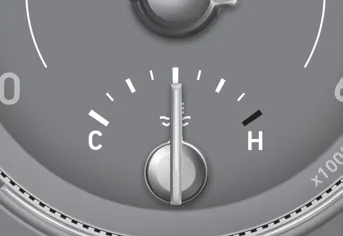Hyundai Venue (QX): Speedometer & Tachometer / Engine coolant temperature gauge

This gauge indicates the temperature of the engine coolant when the ignition switch is in the ON position.
NOTICE
If the gauge pointer moves beyond the normal range area toward the "H" position, it indicates overheating that may damage the engine.
Do not continue driving with an overheated engine. If your engine overheats, refer to "If the Engine Overheats" in chapter 7.
WARNING
Never remove the radiator cap or reservoir cap when the engine is hot. The engine coolant is under pressure and could severely burn. Wait until the engine is cool before adding coolant to the reservoir.
Speedometer The speedometer indicates the speed of the vehicle and is calibrated in miles per hour (MPH) and/or kilometers per hour (km/h). Tachometer The tachometer indicates the approximate number of engine revolutions per minute (RPM).
This gauge indicates the approximate amount of fuel remaining in the fuel tank. Information The fuel tank capacity is given in chapter 2. The fuel gauge is supplemented by a low fuel warning light, which will illuminate when the fuel tank is nearly empty.
Other information:
Hyundai Venue (QX) (2020-2026) Service Manual: Description and operation
Description The immobilizer system will disable the vehicle unless the proper ignition key is used, in addition to the currently available anti-theft systems such as car alarms, the immobilizer system aims to drastically reduce the rate of auto theft.
Hyundai Venue (QX) (2020-2026) Service Manual: Heater Core. Repair procedures
Replacement 1. Remove the heater unit assembly. (Refer to Heater - "Heater Unit") 2. Loosen the mounting screws and remove the heater core cover (A). 3.
Categories
- Manuals Home
- Hyundai Venue Owners Manual
- Hyundai Venue Service Manual
- Normal Maintenance Schedule
- Repair procedures
- Liftgate
- New on site
- Most important about car
